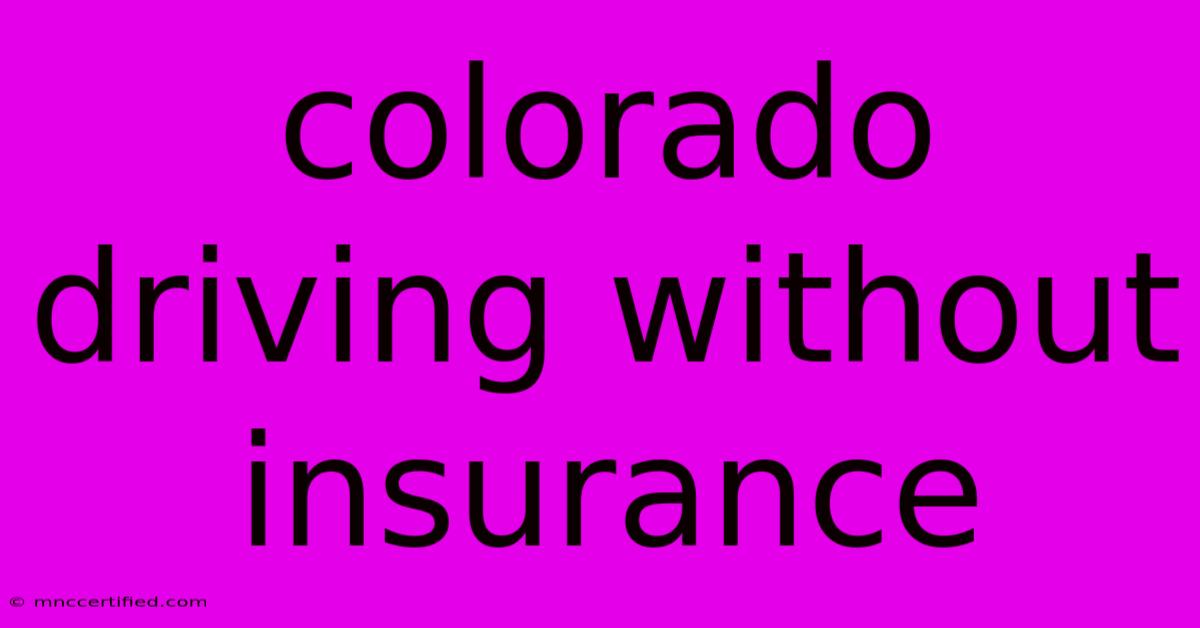Colorado Driving Without Insurance

Table of Contents
Colorado Driving Without Insurance: Penalties, Fines, and What You Need to Know
Driving without insurance in Colorado is a serious offense with significant consequences. This comprehensive guide details the penalties, legal ramifications, and steps you can take to avoid facing these issues. Understanding Colorado's insurance laws is crucial for every driver in the state.
The Seriousness of Driving Uninsured in Colorado
Colorado is a state that takes uninsured driving very seriously. Operating a vehicle without the minimum required liability insurance is not just a minor infraction; it's a violation that can lead to substantial fines, license suspension, and even vehicle impoundment. The potential costs far outweigh the perceived savings of forgoing insurance.
Minimum Insurance Requirements in Colorado
Before diving into the penalties, it's vital to understand Colorado's minimum insurance requirements. You are legally required to carry at least:
- $25,000 Bodily Injury Liability: This covers injuries to another person in an accident you cause.
- $15,000 Property Damage Liability: This covers damage to another person's property in an accident you cause.
Failing to meet these minimums leaves you vulnerable to significant financial liability in the event of an accident. Even a minor fender bender can lead to thousands of dollars in repair costs.
Penalties for Driving Without Insurance in Colorado
The consequences of driving uninsured in Colorado are severe and can include:
- Fines: Expect hefty fines, which can vary depending on the circumstances and whether it's a first or subsequent offense. These fines can range from hundreds to thousands of dollars.
- License Suspension: Your driver's license will likely be suspended. The length of the suspension depends on the number of offenses and other factors. Getting your license reinstated usually involves paying reinstatement fees and potentially completing additional requirements.
- Vehicle Impoundment: Your vehicle may be impounded, and you'll have to pay impound fees to get it back.
- Points on Your Driving Record: Points added to your driving record can lead to higher insurance premiums in the future, even if you obtain insurance after the violation. This can significantly impact your insurance costs for years to come.
- SR-22 Requirement: After a conviction for driving without insurance, you'll likely be required to file an SR-22 form with the state. This is a certificate of insurance proving you have maintained continuous insurance coverage for a specified period. Failing to maintain this coverage can result in further penalties.
Avoiding Penalties: How to Stay Insured in Colorado
The best way to avoid these penalties is to maintain continuous car insurance coverage. Here are some tips:
- Shop Around: Compare quotes from multiple insurance providers to find the most affordable option that meets your needs. Numerous online comparison tools can help simplify this process.
- Bundle Your Policies: Combining your car insurance with other types of insurance, such as homeowners or renters insurance, can often result in significant discounts.
- Maintain a Clean Driving Record: A good driving record translates to lower premiums, making insurance more affordable.
- Consider High-Risk Insurance: If you have a poor driving record or have been previously uninsured, you may need to explore high-risk insurance options. These policies are more expensive but provide the necessary coverage to comply with the law.
- Understand Your Policy: Review your insurance policy regularly to ensure you understand the coverage you have and any potential gaps.
What to Do if You're Pulled Over Without Insurance
If you're stopped by law enforcement and you're uninsured, be honest and cooperative. Arguing or resisting will likely exacerbate the situation. The officer will take appropriate action according to Colorado law. You will likely face the penalties outlined above.
Seeking Legal Counsel
Facing charges for driving without insurance in Colorado can be stressful. It's advisable to consult with a qualified attorney specializing in traffic violations. They can explain your rights and options, potentially mitigating the penalties you face.
This information is for educational purposes only and should not be considered legal advice. Always consult with legal professionals for specific guidance on your situation. Driving without insurance in Colorado is a serious offense with potentially significant financial and legal consequences. Prioritize responsible driving and maintaining adequate insurance coverage to avoid these issues.

Thank you for visiting our website wich cover about Colorado Driving Without Insurance. We hope the information provided has been useful to you. Feel free to contact us if you have any questions or need further assistance. See you next time and dont miss to bookmark.
Featured Posts
-
Premier Insurance Group Agency Llc
Nov 16, 2024
-
Collision Repair Without Insurance
Nov 16, 2024
-
Cargo Liability Insurance Coverage
Nov 16, 2024
-
Davinas Rare Tumor Upcoming Surgery
Nov 16, 2024
-
Tyson Paul Fight Tonight Time Tv Odds
Nov 16, 2024